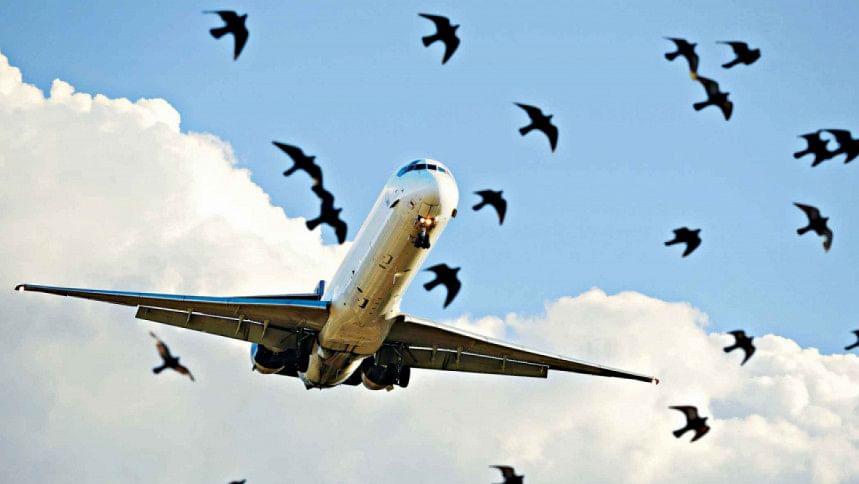Secure Dhaka airport from bird strikes

Top flight safety officials from various airlines yesterday expressed concerns over bird strike hazards at Dhaka's Hazrat Shahjalal International Airport (HSIA) and urged regulators to take action to address the issue.
They said the airport is particularly prone to bird strikes.
At a workshop organised by the Civil Aviation Authority of Bangladesh (CAAB), safety officials from four airlines also highlighted the challenges posed by low visibility during winter due to dense fog, which often forces flight diversions and causes passenger inconvenience.
They suggested upgrading the airport's Instrument Landing System (ILS) from Category 1 to Category 2 to address the visibility issue.
The workshop was organised by CAAB at its auditorium, following recent aviation disasters, including South Korea's Jeju Air plane crash on December 29, which killed 179 people on board.
According to an Al Jazeera report, the pilot had reported a bird strike moments before the plane crashed.
Aviation experts said bird strikes during take-offs and landings are particularly dangerous as they can cause jet engines to lose thrust, potentially leading to accidents.
Biman Bangladesh Airlines officials said bird strikes, though not fatal, frequently damage their aircraft at HSIA and other airfields.
Officials of other airlines said bird strikes have become frequent at Dhaka airport, resulting in significant financial losses.
Bird strikes are common in Bangladeshi airports. The presence of waste collection centres, landfills, and dense bushes near the airport area attracts birds, particularly black kites, posing significant risks of bird strikes.
Presenting his paper, Capt Intekhab Hossain, deputy chief of flight safety at Biman, noted 10 major bird strike incidents between May 2023 and May 2024.
Referring to the Jeju Air crash, he urged CAAB to implement measures to deter birds in and around the airport to avoid such accidents.
Capt AAMA Shahsuzzaman, head of safety management at US-Bangla Airlines, said HSIA's bird strike rate is three times higher than the global average.
Citing International Air Transport Agency data from January 2023 to October 2024, he said HSIA recorded 1.73 bird strikes per 1,000 flights, compared to 0.5 at other international airports.
Talking to reporters, Capt Kamrul Islam, head of safety at Air Astra, said bird strikes can occur anytime but typically occur during take-offs or landings. The severity of damage depends on the size and number of birds or the intensity of the collision.
Prof Anwarul Haq of Sher-e-Bangla Agricultural University, head of a three-member committee to detect seasonal bird activity around HSIA, said bird strikes are common in Bangladeshi airports.
The presence of waste collection centres, landfills, and dense bushes near the airport area attracts birds, particularly black kites, posing significant risks, he added.
Dense bushes in the airport area are good habitats for grasshoppers and butterflies and attract different types of birds to the HSIA, he said.
He suggested using modern and conventional methods to deter birds, such as removing food sources for the birds and the insects and clearing bushes and trees where the birds nest, so the birds seek alternative nesting and feeding grounds.
On flight disruptions caused by dense fog, Capt Ashfaq-Ur-Rahman Khan, head of flight safety at Novoair, said upgrading ILS to Category 2 would allow pilots to land in low visibility, as now it's common for flights to divert from HSIA to other airports due to this issue.
"ILS is a radio signal and lighting array-based precision system that provides pilots with vertical and horizontal guidance during landings in thick fog. Its absence wastes time, energy, and money, causing passenger suffering and financial losses for airlines," he said.
CAAB Chairman Air Vice Marshal Monjur Kabir Bhuiyan assured that steps are being taken to improve safety standards.
"We understand the concerns and anxieties of the public. I would like to assure you that every possible step is being taken to ensure the highest standards of safety in our airspace, as recent tragic aviation disasters remind us of the importance of vigilance," he said.
He urged the airlines to adopt a "just culture" to facilitate the implementation of Safety Management Systems (SMS).

 For all latest news, follow The Daily Star's Google News channel.
For all latest news, follow The Daily Star's Google News channel. 



Comments